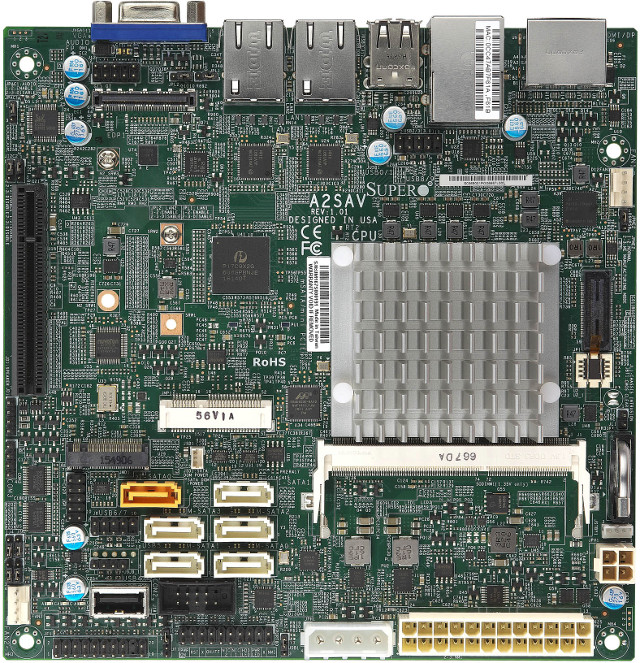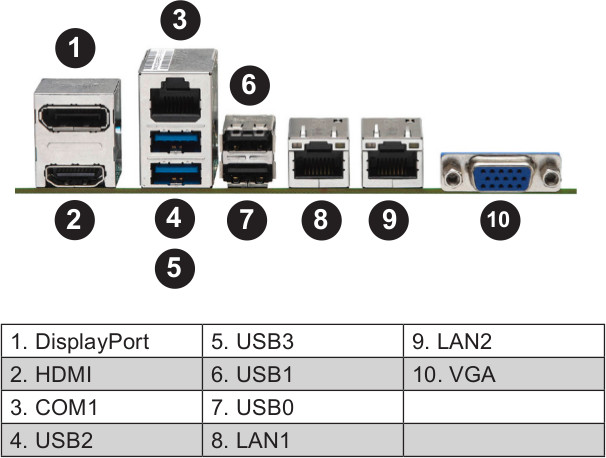Intel introduced three Atom E3900 series Apollo Lake processors last fall that target IoT, industrial and automotive applications, and Supermicro has designed A2SAV mini-ITX board powered by Atom x5-E3940 SoC that comes with lots of interfaces include 6 SATA ports, two Gigabit Ethernet RJ45 ports, and up to 9 USB interfaces accessible from connectors or headers.

Supermicro A2SAV motherboard specifications:
- SoC – Intel Atom x5-E3940 quad core “Apollo Lake” processor @ 1.6 / 1.8 GHz with 2MB L2 cache, 12 EU Intel HD graphics (6.5W TDP)
- System Memory – 1x 204-pin DDR3 SO-DIMM socket for 2, 4, or 8GB 1866/1600/1333MHz Unbuffered non-ECC 204-pin SO-DIMM DDR3
- Storage
- 6x SATA3 ports include 2x from SoC, and 4x via Marvel 88SE9230 controller
- 1x SATA DOM (Disk on Module) power connector
- 64Mb SPI Flash EEPROM with AMI UEFI BIOS supporting Plug and Play (PnP), DMI 2.3, ACPI 5.0, USB Keyboard, SMBIOS 2.7.1, and UEFI
- mSATA and M.2 (See expansion below)
- Connectivity – Dual GbE LAN with Intel i210-AT controller
- Video Output – 1x VGA, 1x Display Port, 1x HDMI, 1x eDP (Embedded Display Port)
- USB – 2x USB 3.0 ports (rear), 7x USB 2.0 port (2x rear, 4 via headers, 1x type A)
- Serial – 3x COM ports using RJ45, RS232 and RS485 ports
- Expansion
- 1x PCIe 2.0 (in x8) slot
- 2x M.2 PCIe 2.0, M Key 2242/2280
- 1x Mini-PCIe with mSATA
- Misc – Voltage and temperature monitors, chassis intrusion header and detection, system overheat LED, 2x 4-pin fan headers
- Power Supply – ATX Power connector, 4-pin 12V DC power connector
- Dimensions – 17.145cm x 17.145cm (Mini-ITX form factor)
- Temperature Range – 0°C to 60°C
The company can provide mid and mini-tower chassis for the board, as well as a 1U chassis all “optimized for A2SAV motherboard”. There’s no list of supported operating systems yet, but Windows 10 (IoT), and various Linux distributions will certainly run on the board.
Supermicro product page has a few more details including some documents, but it does not mention pricing information. However, the board is listed for back order on Arrow Electronics for $253.73 (back order), and TigerDirect has the light version of the board, named A2SAV-L, with just two SATA ports and fewer USB ports for $169.99.
Thanks to Paul for the tip.

Jean-Luc started CNX Software in 2010 as a part-time endeavor, before quitting his job as a software engineering manager, and starting to write daily news, and reviews full time later in 2011.
Support CNX Software! Donate via cryptocurrencies, become a Patron on Patreon, or purchase goods on Amazon or Aliexpress





